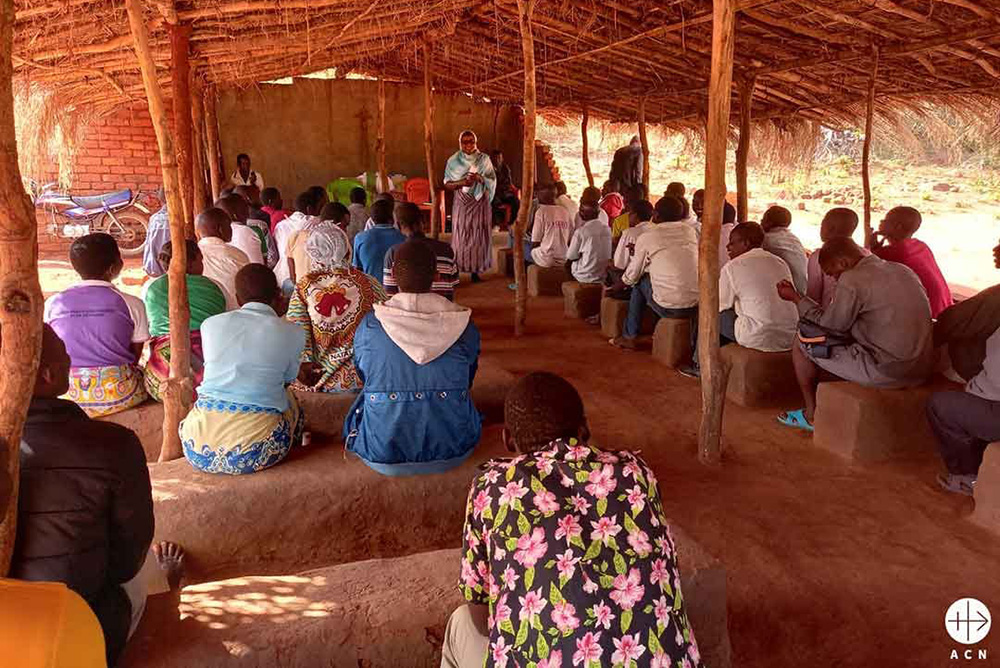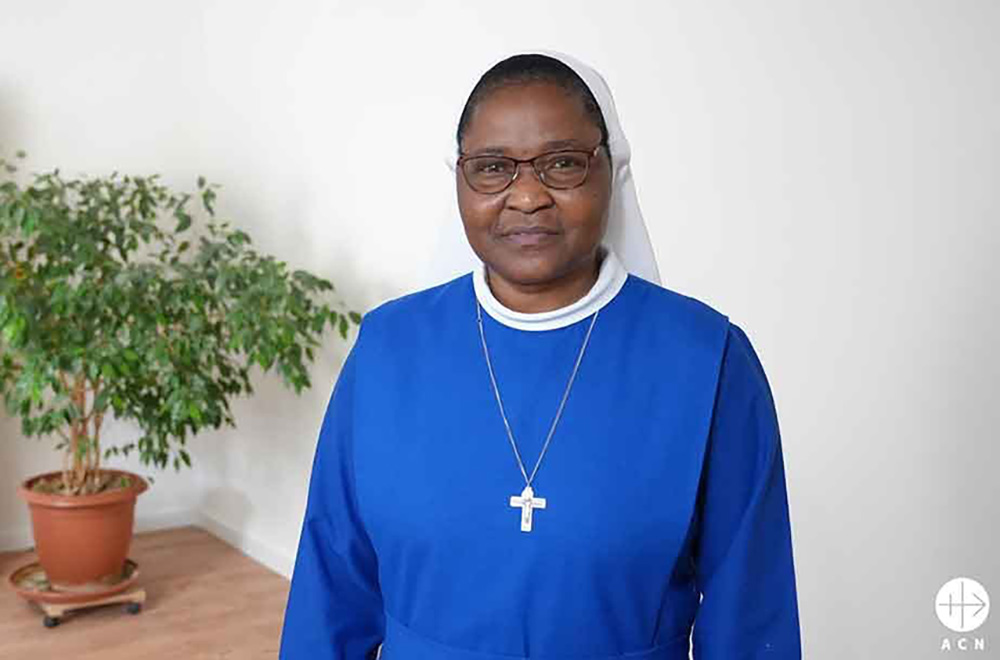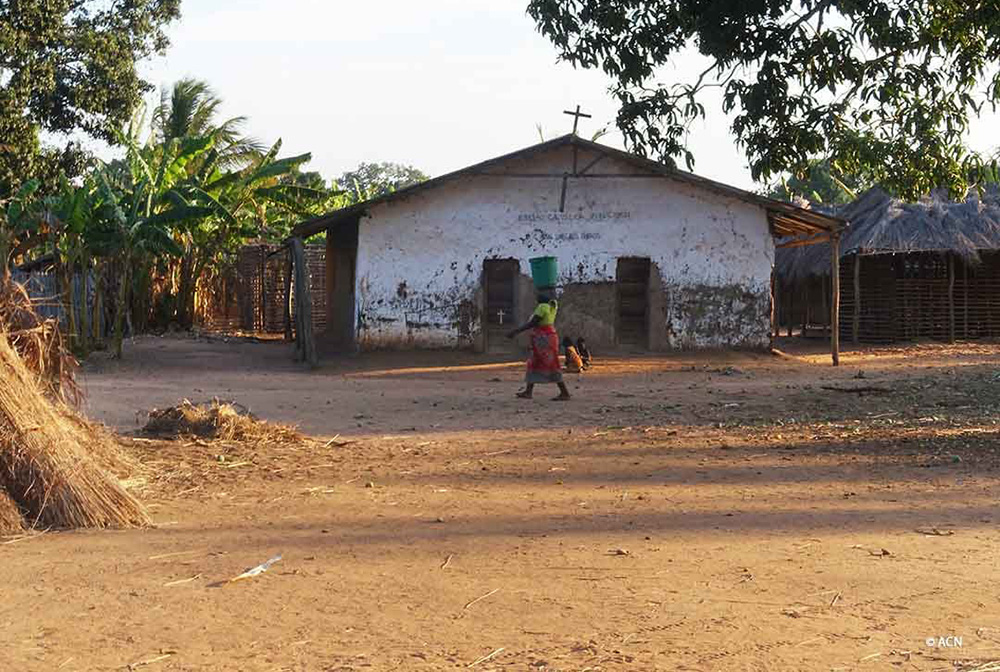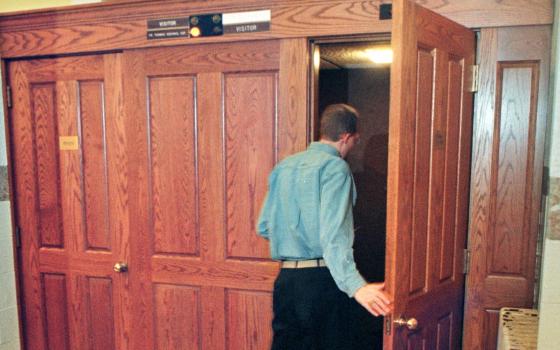
Under a thatched roof chapel, Catholics in a rural Mozambican village gather for catechism and community outreach led by local religious sisters. (Courtesy of Aid to the Church in Need)
Catholic nuns in northern Mozambique are risking their lives to serve thousands of civilians displaced by a brutal Islamist insurgency that has ravaged the region for nearly eight years. The attacks have displaced over 1.3 million people and killed nearly 6,000, according to humanitarian agencies.
In the provinces of Niassa and Cabo Delgado, members of the Missionary Sisters of the Immaculate Conception in Mozambique, the country's first female religious congregation, live and work in the heart of the crisis. There, they care for the wounded, orphaned and traumatized, offering spiritual guidance, basic health care, education and hope to communities shattered by conflict.
"Whenever I have to travel through isolated roads, or through the bush, I ask for God's protection," said the congregational superior Sr. Ermelinda Singua in a recent report from Aid to the Church in Need, a Catholic charity. "Everybody is scared, that's the truth of it. People are risking their lives for love of the Gospel."
Advertisement
The conflict, which began in October 2017 in the gas-rich province of Cabo Delgado, is driven by a group known locally as Ansar al-Sunna but internationally identified as the Islamic State of Mozambique. The insurgents have committed widespread atrocities including beheadings, mass kidnappings and arson. They have targeted both civilians and religious institutions, displacing communities across Cabo Delgado and into neighboring provinces like Niassa and Nampula.
Singua, who often visits internally displaced persons (IDPs) in Niassa's Lichinga Diocese, recounted a terrifying experience in which she and another sister were chased by a lion while rushing a sick baby to a clinic.
"The lion thought we'd taken the rabbit and gave chase," she told Aid to the Church in Need. "I told my other sister to put her foot on the gas, and she accelerated. I thought that was it, that the three of us would die that day, but after about 10 minutes, the lion gave up the chase. But it was God who was looking out for us; He was the one who spared us."
In recent months, renewed attacks have driven another wave of displacement. According to the United Nations, approximately 15,000 people fled their homes between late March and mid-April 2025 alone. Villages like Ancuabe, Nkole, Nonia, Muela, Ngura and Miegane were targeted in nighttime raids involving looting, arson and kidnappings. In some cases, insurgents demanded ransoms of up to 10,000 Mozambican meticais (about $150) under the threat of death.

Sr. Ermelinda Singua serving in northern Mozambique shares her story of courage and hope as she ministers to communities impacted by violence and poverty. (Courtesy of Aid to the Church in Need)
Fr. Kwiriwi Fonseca, a Passionist priest helping displaced families in northern Mozambique, told Aid to the Church in Need in May that Christians are being targeted in a new wave of jihadist attacks, which include killings, kidnappings and the burning of homes and churches.
Fonseca noted that in April, terrorists entered a safari reserve near the Niassa-Cabo Delgado border and beheaded two people. He emphasized that the violence affects people of all faiths, but that Christian communities have suffered heavily, with chapels and social outreach projects destroyed.
"The attacks show that many Christians are suffering — a number of chapels have been burned, as have their houses," he said. "The social projects no longer work, and the people are in despair."
Sisters of Solidarity
Founded in 1948, the Sisters of the Immaculate Conception have long worked in Mozambique's most remote areas. They survived religious persecution during the post-independence Marxist regime, which closed churches and expelled missionaries. Today, their greatest threats are armed insurgents and the gnawing hunger and poverty in displacement camps.
"They never abandoned the people," Singua told Aid to the Church in Need. "Ever since the terrorist attacks began, they never left. It is heroic, they are with the people through good and bad, and that is a witness which gives us all hope, especially in this year of the Jubilee of Hope."
The sisters' missions in Niassa include shelters for orphans and widows, trauma counseling and pastoral support. They also provide basic education and health care services in areas where government and NGO presence is limited. Some sisters live directly in IDP camps — risking their lives daily to minister to the vulnerable.
"You can see the sadness in their faces," Singua said of displaced families. "They are away from their natural surroundings, they have lost everything, including family members. There are more women than men, because the men were killed or taken by the terrorists."

A modest rural chapel in northern Mozambique stands as a spiritual lifeline for a community deeply affected by conflict and displacement. (Courtesy of Aid to the Church in Need)
With resources stretched thin and food insecurity worsening, some families in the displacement camps are resorting to desperate measures. Singua said extreme poverty has led to a rise in child marriages, with girls as young as 10 being married off in the hope that their husbands might provide some relief.
"They are trying to escape misery, but they end up entering into a different kind of misery," she told Aid to the Church in Need.
According to the World Food Programme, 5 million people in Mozambique are currently food insecure and in need of urgent support, with ongoing conflict in Cabo Delgado and neighboring provinces driving hunger among IDPs. In many displacement sites, the World Food Programme and its partners are the only source of nutrition.
Meanwhile, Aid to the Church in Need has delivered emergency food aid to more than 2,000 families in the Pemba Diocese, supplied pastoral vehicles and funded trauma counseling programs.
Yet both clergy and religious sisters agree: material support is not enough.
"We don't just need your support, we also need your prayers … so that the people may have peace," Fonseca said.




